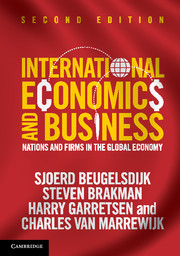Book contents
- Frontmatter
- Contents
- List of figures
- List of tables
- List of boxes
- Preface
- Part I Introduction
- Part II Firms, trade, and location
- Part III Capital, currency, and crises
- 8 Exchange rates
- 9 Currency crises and exchange rate policy
- 10 Gains from international capital mobility
- 11 Financial crises, firms, and the open economy
- 12 The Great Recession
- Part IV Consequences of globalization
- Bibliography
- Author index
- Subject index
11 - Financial crises, firms, and the open economy
from Part III - Capital, currency, and crises
- Frontmatter
- Contents
- List of figures
- List of tables
- List of boxes
- Preface
- Part I Introduction
- Part II Firms, trade, and location
- Part III Capital, currency, and crises
- 8 Exchange rates
- 9 Currency crises and exchange rate policy
- 10 Gains from international capital mobility
- 11 Financial crises, firms, and the open economy
- 12 The Great Recession
- Part IV Consequences of globalization
- Bibliography
- Author index
- Subject index
Summary
Keywords
Twin crisis • Balance sheets • Net worth • Real exchange rate • Fundamentals • Asymmetric information • Firms and banks • External finance premium • Moral hazard • Self-fulfilling expectations • Disruptions • Savings and investment • Third-generation models • Perverse savings • Vicious circle
Introduction and terminology
After the work in Chapter 8 on exchange rates, Chapter 9 on currency crises and the role of international capital mobility, this chapter focuses more generally on financial crises of which currency crises are often an example. As with Chapter 9, and in contrast thus with Chapter 10, Chapter 11 zooms in on the drawbacks or costs of international capital mobility.
As we explained in Chapter 9, a currency crisis is a disruption on the currency market in which a speculative attack on a currency leads to a devaluation and/or to the monetary authorities defending the exchange rate by depleting their foreign exchange reserves and/or raising interest rates. A capital account crisis is the mirror image of a currency crisis, focusing on the sudden reversal of capital flows that accompanies the currency market disruption. As such, a currency or capital account crisis is a potential external channel for a financial crisis. Its domestic equivalent is a banking crisis, in which the increased fragility of a country’s banking sector, potentially leading to bank runs, forces the government to intervene and/or banks to scale down their business, which is a potential internal channel for a financial crisis. It is customary to refer to a ‘twin crisis’ if a banking crisis and a currency crisis occur (almost) at the same time. The word ‘potential’ is used in both cases above because not every currency crisis or banking crisis is a financial crisis.
- Type
- Chapter
- Information
- International Economics and BusinessNations and Firms in the Global Economy, pp. 311 - 332Publisher: Cambridge University PressPrint publication year: 2013



